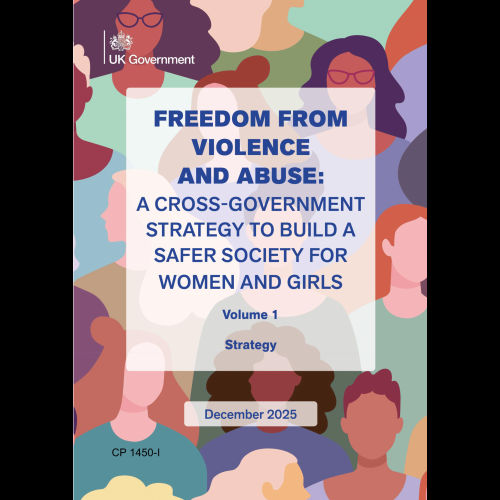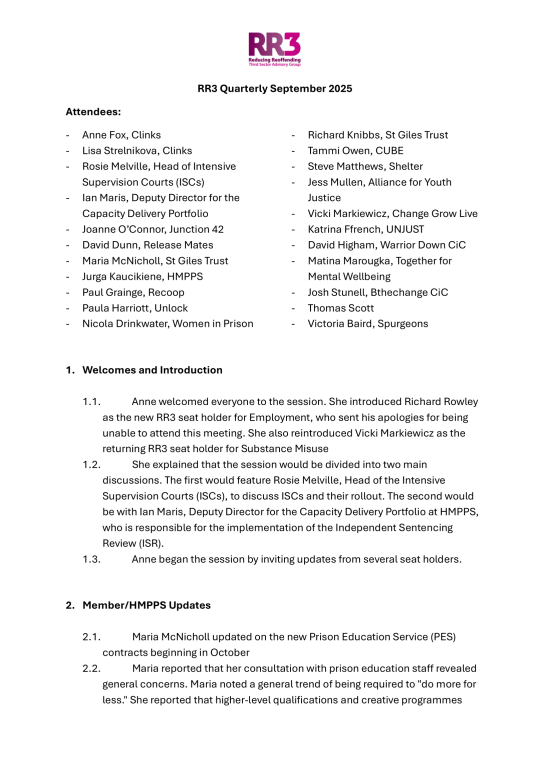This is the first in a series of blogs that give a detailed account of the experience of voluntary organisations working in criminal justice, focusing in the needs of their service users, their service delivery and their funding situation. The information has been edited from a selection of in-depth interviews that were conducted as part of our data collection for the state of the sector work. The blogs are from a range of organisations to represent the diversity of voluntary organisations working in criminal justice. We have protected organisations anonymity to allow them to speak freely.
“We are optimistic about the future”
The interviewee has been with the organisation for one and a half years and has worked in the criminal justice sector for about four years.
What are the needs of your service users and how are you responding?
We are seeing an increase in people who are coming to us with complex needs, especially younger people. Within the prison services that we run for young people we see less people being put into custody but the ones in custody have more complex needs, including mental health challenges, brain injuries, and challenging family relationships.
It’s the lack of provision elsewhere. Previously young people may have been signposted to mental health services and there may have been resources in schools to help and manage them. All of that has been cut. So now we are seeing the impact of those cuts in older people coming to us with more complex needs.
It is really difficult to deliver services if there are not enough prison officers to let our staff out onto the wings. If the wings aren’t open, we can’t work. If people are locked out, we can’t work. If people are suffering from mental health challenges and can’t get out of their cells, then we can’t work.
We have had to take a different approach to training our people. Our people need to be excellent all-rounders, they need to be able to understand and recognise mental health challenges and signpost people to different services that can meet their complex needs. We are dealing with people who are in much more challenging situations so our staff and volunteers need to be aware of gang dynamics, and they need to be aware of de-escalation tactics. The emotional resilience that our staff and volunteers need to have is huge and our staff turnover has increased recently. It’s harder to recruit because people see negative documentaries of what life is like in prison and then they don’t want to do anything there.
What does your overall funding situation look like?
Historically, we were funded more by grants, but we thought that it would be more challenging to access this type of funding so we moved away from that to a contract delivery model. So the majority of our income comes through contract delivery with a little bit of philanthropy and social investment.
A lot of contracts we are delivering on have a Payment by Results (PbR) element, and if a contract is paying by result you don’t get the money until the results come in. So that’s where our reserves come in as we use those to pay staff salaries and ongoing costs until the results payment come in. It can sometimes be difficult for us to hit milestones in PbR contracts and to get the qualifying numbers of service users needed, which in many cases this is due to conditions that are out of our control.
I think that post the Transforming Rehabilitation reforms to probation many funders either think that voluntary sector organisations are delivering on those contracts so are able to access the funding they need or the funders themselves are also choosing to move out of criminal justice. So I think that now there is less support from the trusts and foundations out there which has had a wider impact on the voluntary sector as there is a reduction in funding available, so many different players are going for the same pot of money.
What challenges or opportunities is your organisation facing in the future?
Criminal justice is just one part of the work our organisation does and what we see in justice makes us hungry to do better across everything we do. The people that end up in prison, tend to be at the end of a long journey in which they have been failed by a couple of services. So what we see makes us so angry that we want to fix the rest of the social justice system.
The main challenges at the moment are the work conditions in prison. There is a lack of prison officers and a lack of funding and resource, which makes delivering a lot of our work challenging.
We can come up with ideas but we shouldn’t wait for someone to come to us. We need to organise, we need to partner, we need to create and we need to deliver. The voluntary sector has that ability, but we need to do it now because people are suffering. We are optimistic about the future and think there are some real opportunities on the horizon.
-----------------------------------------------------------------------------------------
Join us for the launch of the State of the Sector Report 2017 on the 12th July to discuss this year’s findings, network with others working in criminal justice and inform Clinks’ future work.
Book your place here
What's new
Blogs
Violence Against Women and Girls (VAWG) Strategy Blog
Publications
Latest on X
The role is for a leader from an organisation focused on racially minoritised people, with expertise in service delivery, policy, advocacy, or related areas in criminal justice. Racial disparities are present at every CJS stage. This role ensures these voices are central in shaping policy to help address and eradicate them. Apply by Mon 18 Nov, 10am. More info: https://www.clinks.org/voluntary-community-sector/vacancies/15566 #CriminalJustice #RR3 #RacialEquity

